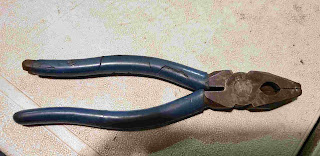Let me tell you about Eugene, and police work in the early 1980s, Names have been changed to protect the ignorant.
When I started police work in 1980, there were no computers. The sheriff's office still had a teletype machine. When a person was arrested, and fingerprints taken, we took those prints on cards with printers ink.
At the time, I was working as a Probation and Parole officer out of the little office in Natchitoches, LA. One day, in court, a fellow stepped up for arraignment and pled straight up guilty to a Simple Burglary. That took the Court by surprise, so the judge read him his right, giving him the full Boykin reading, making sure that he understood what was happening. Our defendant was a black male in his mid 30s. No one locally had ever heard of him.
Then the Judge asked him a question. "Have you ever been in trouble?"
"No, sir."
"Ever been to prison?"
"No, sir."
The judge gave him the standard sentence at that time for Simple Burglary. Three years DOC, which was suspended and the was placed on three years supervised probation.
The judge pointed at me. "See the probation officer."
I took Eugene to my office, got some basic information, took fingerprints and a mug shot and told him to go home, I'd be around to see him. I dropped the intake packet on a steno's desk and went about my duties. Just another day as a Probation officer. About a month later, I got a Criminal History from the state police. We called it a "rap sheet", and Eugene was clean. No criminal record in Louisiana. So far, so good. I had seen Eugene a couple of times. He wa living with a woman in Natchez, LA, and looking for work.
Natchez, LA is a little village in Natchitoches parish. About 700 souls, the main economic activity is agriculture and poverty. There ain't much happening in Natchez. They do have a mayor and a part-time city marshal, one convenience store and a honky-tonk. Plus a Section 8 project and numerous run down rental houses.
Several weeks later, I was going through my mail and found a rap sheet from the FBI. It seems that Eugene had misled the Court. He had been in prison in seven other states across the US, and had been convicted of no less than 12 felony offenses, I wrote a memo to the Judge and attached a copy of Eugene's rap sheet. Before the week was out, the Judge had issued a warrant, citing clear misrepresentation during the sentencing phase, and ordering me to lock up Eugene pending re-sentencing.
The next morning, I was out looking for Eugene. I went to his address and talked to a woman there who told me that Eugene had left about an hour or so, heading toward the store, where he hoped to catch a ride to look for work. I didn't mention the warrant. It didn't seem pertinent. Driving out, I happened across the town marshal, a young black guy named Willie. We exchanged pleasantries, Willie told me that he was looking for someone who had just stolen a 16 foot extension ladder from a house, Willie pointed down the road, and I could see men standing on a roof, patching the shingles. Someone had stolen their ladder while they were on the roof.
I told Willie I'd keep my eyes peeled, and, by the way, I had a warrant for Eugene. I made a couple of loops through town, talking with residents, and decided to cross the one bridge in town, that connected Highway 1 and the Old River Road. As I turned on to the bridge, I saw Eugene, about mid-span. He was looking to the south, and was holding a 16 foot extension ladder. How lucky can you get?
I called Willy on the radio, and told him that I was about to put the habeas cuffus on Eugene, and he could find the ladder on the bridge. I'm sure the guys on the roof appreciated it.
Later that month, the judge re-sentenced Eugene, giving him six years in prison, and cautioning him not to return to Natchitoches.




